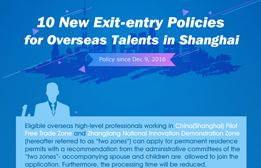CPPCC members in Shanghai call for better environment for overseas talent

High-rises dominate the skyline on both sides of the Huangpu River in Shanghai. [Photo by Gao Erqiang/China Daily]
In recent years, increasing numbers of overseas talent have come to China to develop their careers. How can we ensure they "stay, perform well, and have opportunities for growth"?
Three members of the National Committee of the Chinese People's Political Consultative Conference (CPPCC) in Shanghai discussed this topic in a recent interview.
The three members are Yuan Wen, president of Shanghai Normal University, Zhang Wenming, deputy director of the National Institutes of Educational Policy Research at East China Normal University, and Situ Guohai, deputy director of the Department of Aerospace Laser Technology and Systems at the Shanghai Institute of Optics and Fine Mechanics of the Chinese Academy of Sciences.
These three CPPCC members, a university administrator, a researcher of talent policies, and an overseas returnee, jointly emphasized that the most important criterion for assessing the quality of the talent development environment is whether there is enough space for them to "fully utilize their talents and abilities". They called for the creation of a "warmer talent development environment", allowing everyone to focus on profound issues and engage in long-term research.
Strengthening teams: Talent no longer "fighting alone"
Reporter: The government work report mentions sustained efforts to improve the talent development environment. What challenges do overseas talents face when working in China?
Situ Guohai: For overseas talent to "perform well and have opportunities for growth", they must integrate into the universities and research institutes where they are based. My suggestion is to provide them with teams - teams can help foreign nationals coordinate their work, ensure that senior talents efficiently carry out their work; and help young scholars adapt more quickly and integrate into the domestic academic environment through team mentoring.
Yuan Wen: Indeed. A collaborative atmosphere within the team gives overseas talent a sense of not "fighting alone". From our observations, overseas talents with teams tend to adapt better, experience more stable personal development, and feel a greater sense of belonging at their universities. We have also found that what makes non-Chinese overseas talent "stay and perform well" at universities is often the presence of strong disciplines. The latter have significant international influence, extensive international exchanges, and mature research teams, all of which are important factors in attracting them talent.
Zhang Wenming: This also reminds us that universities should not only focus on attracting overseas talent but also effectively cultivating teams. Establishing a "talent nurturing talent" mechanism is crucial. For those key high-end talents, relevant provisions should be set to encourage them to strengthen the training of local talents within the team, thereby achieving the full utilization of talent through team building.
Optimizing assessment: More flexibility needed
Reporter: The government work report mentions the need to improve the mechanism for discovering and cultivating top-notch innovative talent. A crucial aspect is to enhance the assessment mechanism for various talents.
Zhang Wenming: Analysis shows that the achievements of overseas talent are mainly concentrated in areas such as academic papers, with limited contributions to industrial development. In the future, there should be a shift towards the practical application of research outcomes. Emphasis should be placed on the practical evaluation of relevant research outcomes, and more practical and effective comprehensive talent evaluation policies should be formulated.
Situ Guohai: They should be provided with a relatively relaxed environment and be allowed to fail. Recently, a researcher in our institute published a paper in Nature. He worked diligently during his Ph.D. studies, and less than two years after graduating, he showcased all his accumulated knowledge in a top international journal. I wonder if our policies could allow for more flexibility and avoid rigid assessment systems.
For instance, we have a five-year assessment period for overseas talent. If they fail to meet the requirements, they might be dismissed. Perhaps at this point, their research has reached a critical breakthrough. Could we change the assessment model and have authoritative experts from both domestic and international backgrounds evaluate their research outcomes? Maybe in a few more years, they will yield results. This would be beneficial for the individual and the university. Similarly, we used to assess all researchers equally every year, but later divided them into different levels - fourth-level researchers are assessed annually, third-level researchers every two years, and second-level researchers every three years. This way, high-end talents have more energy to conduct directional research, and the results have been quite promising. This indicates that each unit can continuously explore and find an assessment system that suits its talents.
We need to design different development paths and platforms for different talents, and policies should move towards diversification, making them more adaptable.
Policy Supply: Policies of different parties should not conflict
Reporter: What improvements can be made in the policy supply field to cultivate and foster more top-notch scientific and technological leaders and innovative teams?
Zhang Wenming: Currently, relevant talent policies still adhere to the traditional emphasis on demand. The policy toolbox currently focuses mainly on hard environmental support for talent, lacking necessary tools for the soft environment of talent growth and development. We should break down departmental barriers and strengthen discussions on policy, formulating more practical and effective comprehensive talent evaluation policies.
Situ Guohai: It is advisable to avoid bringing in talent just to meet the quota for overseas talent. Introducing talent in this manner may not align with the development plans of the unit, leading to a waste of resources. We need to be cautious in the process of recruiting talent, clearly understanding why we are bringing them in and what role they will play after their arrival. This is a responsibility for both the unit and the individual.
Reporter: This suggests that effective policy design should be implemented at every stage, starting from talent introduction.
Yuan Wen: Firstly, the various stages of talent development policies, including introduction, cultivation, management, and services, should adhere to the principle of consistency. Policies at different stages should not be fragmented, let alone conflicting. Secondly, to address the common problems faced by overseas talent, we can create a checklist on "how to become an ideal place for overseas talent", outlining the conditions that should be created for all overseas talent. Finally, efforts should be made to address the individual issues of overseas talents. When we talk about providing overseas talent with a "warm and responsive environment", it does not mean giving them everything they want, but rather that their demands will be promptly addressed, striving to create an environment that is "similar to overseas research environments" for overseas talent.

 Print
Print Mail
Mail




